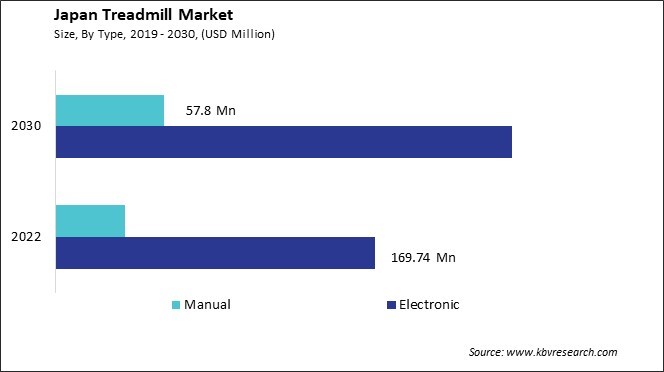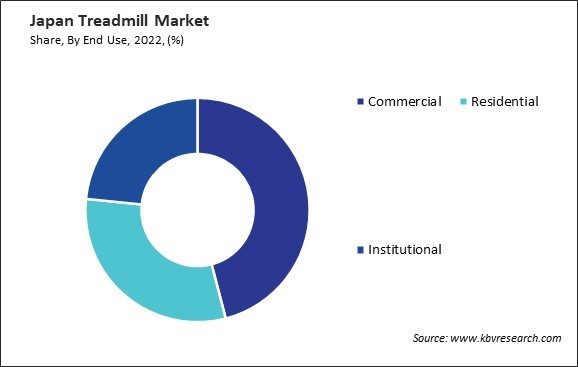The Japan Treadmill Market size is expected to reach $300.06 million by 2030, rising at a market growth of 4.9% CAGR during the forecast period. In the year 2022, the market attained a volume of 426.06 thousand units, experiencing a growth of 4.7% (2019-2022).
The treadmill market in Japan reflects a unique blend of technological innovation, health consciousness, and cultural preferences. One key factor contributing to the success of the treadmill market in Japan is the integration of advanced technology. Cultural factors also play a significant role in shaping the treadmill market in Japan. The concept of "ikigai," or finding joy and purpose in one's life, is deeply ingrained in Japanese culture. Treadmills are seen not only as fitness equipment but also as tools for stress relief and mental well-being.

The treadmill market in Japan has witnessed continuous innovation, with manufacturers incorporating advanced technologies to enhance user experience. Interactive features, virtual training programs, and smart connectivity have become key selling points for modern treadmills. These advancements cater to tech-savvy consumers who seek a more engaging and personalized workout experience.
As urban spaces become more crowded, the convenience of having a treadmill at home aligns with the Japanese lifestyle, where time efficiency is highly valued. The COVID-19 pandemic has significantly influenced the treadmill market in Japan, as it has globally. With lockdowns, social distancing measures, and the closure of fitness centers, people turned to home-based fitness solutions. This sudden shift in consumer behavior led to a surge in demand for treadmills and other home exercise equipment. Manufacturers and retailers adapted to this trend by increasing production and enhancing their online presence to meet the growing demand.
Japan has witnessed a remarkable surge in treadmill sales in recent years, driven by a confluence of factors that have reshaped consumer behavior and preferences. The burgeoning popularity of e-commerce platforms and the resilience of the retail sector have been pivotal in propelling the treadmill market to new heights.
E-commerce platforms have played a pivotal role in reshaping the retail landscape for treadmill sales in Japan. The convenience of online shopping, with many product choices and competitive pricing, has lured many consumers to explore and purchase treadmills through digital channels. Major e-commerce players in Japan have capitalized on this trend by enhancing their product offerings, providing detailed product information, ensuring efficient delivery services, and creating a seamless shopping experience for consumers.
Simultaneously, traditional retail outlets have adapted to the evolving Japanese consumer preferences by optimizing their in-store experiences. Specialized fitness and department stores have curated dedicated sections for home fitness equipment, including treadmills, allowing consumers to physically engage with the products before purchasing.
According to the International Trade Administration, in 2018, the Japanese e-commerce industry accounted for a noteworthy $163.5 billion in sales. According to the latest survey data, Japanese consumers engaging in online purchases spent an average of Yen 33,536 (approximately $305) in January 2020. This reflects a significant 13.7% surge from the Yen 29,499 (approximately $268) spent in January 2018. Notably, the expansion is evident in the amount spent and the number of households participating in online transactions, which rose from 36.3% to 42.8%. This data underscores the thriving industry for treadmills in Japan, with both e-commerce and retail channels contributing to increased sales and consumer engagement in the treadmill market.
Therefore, the treadmill market in Japan continues to flourish, with both e-commerce and retail channels complementing each other to meet the diverse preferences of the evolving consumer base. This harmonious integration of online and offline retail experiences is poised to sustain and further propel the upward trajectory of treadmill sales in Japan.
In Japan, health and fitness awareness has become increasingly prominent, with a particular focus on the treadmill market. As the nation embraces a modern and fast-paced lifestyle, there is a growing recognition of the importance of maintaining a healthy and active lifestyle. This awareness has translated into a surge in the demand for fitness equipment, with treadmills emerging as a popular choice for individuals looking to incorporate cardiovascular exercise into their routines.
The treadmill market has witnessed a significant shift in consumer preferences, with a heightened emphasis on advanced features and technological integration. Japanese consumers are increasingly drawn to treadmills with interactive interfaces, virtual training programs, and real-time performance tracking. This reflects a broader societal trend where individuals seek physical activity and engage with cutting-edge technology to enhance their overall fitness experience.
Moreover, the awareness of the health benefits associated with regular treadmill usage has permeated various age groups and demographics in Japan. The aging population, in particular, recognizes the importance of maintaining mobility and cardiovascular health, driving a surge in demand for treadmills designed to cater to diverse fitness levels. Additionally, corporate wellness initiatives and health-conscious policies implemented by companies have contributed to the popularity of treadmills in workplace environments, further promoting a culture of fitness and well-being. Thus, with the convergence of technology, changing consumer preferences, and a heightened focus on well-being, the treadmill market in Japan is poised for continued growth as it becomes an integral component of the country's evolving fitness landscape.

The treadmill market in Japan reflects a unique blend of technological innovation, cultural preferences, and a growing emphasis on health and fitness. Several companies play a significant role in shaping this industry by offering a range of treadmills tailored to the needs and tastes of Japanese consumers.
A notable player in the Japanese treadmill market is AIBI International. AIBI is recognized for its commitment to delivering high-quality fitness equipment, including treadmills. The company emphasizes space-saving designs and user-friendly features, catering to the limited living spaces commonly found in Japanese households. AIBI's treadmills often incorporate innovative technologies to enhance the overall fitness experience.
Yamasa Co., Ltd. is another key participant in the Japanese treadmill industry. With a focus on providing reliable and durable fitness equipment, Yamasa offers treadmills designed for residential and commercial use. The company's products often feature compact designs and energy-saving functionalities, aligning with the preferences of Japanese consumers who prioritize efficiency and sustainability.
Daiwa Co., Ltd. is a prominent Japanese company contributing to the treadmill market. Known for its diverse range of fitness equipment, Daiwa manufactures treadmills that emphasize functionality and performance. The brand caters to various consumer segments, from casual home users to fitness enthusiasts seeking advanced workout features.
BH Fitness Japan, a subsidiary of the global BH Group, is actively involved in the Japanese treadmill market. BH Fitness is recognized for its technologically advanced treadmills, often equipped with interactive touchscreens, multimedia capabilities, and fitness-tracking features. The company targets residential and commercial industries, providing options for home users and fitness facilities across Japan.
Panasonic, a well-established electronics company, has ventured into the fitness equipment sector, including treadmills. Leveraging its reputation for innovation and reliability, Panasonic offers treadmills that integrate seamlessly with modern lifestyles. These companies operate in a competitive landscape where factors such as technological innovation, space-saving designs, and user-friendly interfaces play a crucial role in capturing the attention of Japanese consumers.
By Product Type
By End Use
By Distribution Channel
Our team of dedicated experts can provide you with attractive expansion opportunities for your business.

